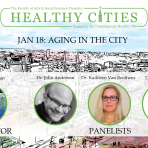Aging in the City – Healthy Cities Lecture Series
Aging in the City – Healthy Cities Lecture Series
Categories: General, Lectures and Seminars, Sustainability, Town Halls / Info Sessions, Virtual | Intended for Anyone

Location Details
Virtual: https://carleton.ca/fass/event/healthy-cities-panel-aging-in-the-city/
Contact Information
Nicholas Ward, 6138181403, nick.ward@carleton.ca
Registration
Cost
$0
About this Event
Host Organization: The Faculty of Arts and Social Sciences
More Information: Please click here for additional details.
"What defines a healthy city?"
Join the Faculty of Arts and Social Sciences for a series of expert panels to explore the many factors – from nature and housing to climate and art – that make a healthy city.
Aging is something we all face. As we age, our reaction times slow down and our ability to switch between tasks diminishes. You might notice, for example, that you have greater difficulty recalling recent events, or that cooking a complex meal has become more challenging. We would all like to age gracefully, maintain our cognitive abilities, and our independence for as long as possible.
Can we prevent cognitive decline? Work by Dr. John Anderson suggests this is possible to a degree. But it requires a lifetime investment in building cognitive reserve via intense engagement with cognitively challenging activities (whether through education, learning multiple languages, or a cognitively challenging career), while simultaneously avoiding risk factors such as poor diet and sedentary lifestyle, and depression. Dr. Anderson also studies contextual factors older adults can use to scaffold their performance such as doing their most challenging activities in the morning (an optimal circadian time for most older adults).
Research by Dr. Kathleen Van Benthem and Dr. Chris Herdman focuses on extending the mobility of mature adults in the community by finding ways to properly assess and support older drivers. This work has also been applied to older pilots.
Dr. Bruce Wallace’s work focuses on how the average older person can use technology to adapt the environment to their needs, thereby allowing them to stay in their homes for longer. This includes ambient smart home technology that can alert seniors, their family, and their healthcare providers of concerning changes or trends, well before these changes become dangerous.
Moderator and Panelist Bios
Dr. Chris Herdman (moderator) is a Professor in the Department of Psychology at Carleton University and Director of the Advanced Cognitive Engineering Laboratory (ACE Lab). The objective of his research is to discover fundamental principles of human perception and cognition and to apply these principles to the design, implementation and evaluation of advanced human-machine systems.
Dr. John Anderson is an Assistant Professor in the Departments of Cognitive Science and Psychology at Carleton University. Dr. Anderson is the Principal Investigator of the Cognition and Neuroscience of Aging Lab. Dr. Anderson also holds a status-only appointment as an Assistant Professor at the Dalla Lana School of Public Health at the University of Toronto and is an Affiliate Scientist at the Centre for Addiction and Mental Health (CAMH). Dr. Anderson has a Ph.D. in Psychology from the University of Toronto. He completed post-doctoral training in research on bilingualism and cognitive reserve at York University and advanced neuroimaging and the links between depression and dementia in older adults at the Centre for Addiction and Mental Health. Dr. Anderson’s work explores modifiable factors affecting cognition in late-life with a particular focus on supportive contextual factors such as optimal time of testing, or lifestyle factors contributing to cognitive reserve.
Dr. Kathleen Van Benthem is a Senior Research Scientist at the Advanced Cognitive Engineering Laboratory (ACE Lab) and an Adjunct Research Professor at the Department of Cognitive Science. Her research involves the study of cognitive health and risk for older pilots and drivers using full-scale and virtual reality simulators to collect operator performance data. A key goal of her work is to develop a virtual reality cognitive health screening tool for pilots using domain-specific cognitive measures such as pilot situation awareness and prospective memory. In addition to research on cognitive health, Dr. Van Benthem has developed a suite of research methods that capture biometric measures, such as electroencephalography (EEG) and heart rate variability, to investigate how mental workload can be evaluated on a moment-by-moment basis using brain-computer interfaces. She completed a Ph.D. in Cognitive Science from Carleton University and a Masters of Health Studies degree from Athabasca University and a degree in Occupational Therapy from Queen's University (Kingston, ON).
Dr. Bruce Wallace is Executive Director of the AGE-WELL National Innovation Hub on Sensors and Analytics to Monitor Memory and Mobility (SAM3), an Adjunct Research Professor at Carleton University, and an Affiliated Investigator at Bruyère Research Institute. He holds a B.E.Sc. from Western, an M.Eng. and Ph.D. from Carleton University, and has studied business at MIT Sloan and UNC Kenan-Flagler. He is an IEEE Senior Member with more than 20 patents. He worked 24 years in the technology sector at BNR, Avaya and Nortel including research and development, product and business strategy, and as a business leader with global responsibility. He leads SAM3 which is a collaboration between the Bruyère Research Institute and Carleton University in partnership with the AGE-WELL Network Centres of Excellence. Its focus is research and innovation projects focused on technology-based solutions to enable an aging population to maintain a healthy and independent lifestyle.